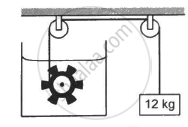Advertisements
Advertisements
प्रश्न
A child running a temperature of 101°F is given an antipyrin (i.e. a medicine that lowers fever) which causes an increase in the rate of evaporation of sweat from his body. If the fever is brought down to 98 °F in 20 min, what is the average rate of extra evaporation caused, by the drug? Assume the evaporation mechanism to be the only way by which heat is lost. The mass of the child is 30 kg. The specific heat of human body is approximately the same as that of water, and latent heat of evaporation of water at that temperature is about 580 cal g–1.
उत्तर १
Initial temperature of the body of the child, T1 = 101°F
Final temperature of the body of the child, T2 = 98°F
Change in temperature, ΔT = `[(101 - 98 xx 5/9)]` °C
Time taken to reduce the temperature, t = 20 min
Mass of the child, m = 30 kg = 30 × 103 g
Specific heat of the human body = Specific heat of water = c
= 1000 cal/kg/ °C
Latent heat of evaporation of water, L = 580 cal g–1
The heat lost by the child is given as: `triangle theta = mc triangleT`
`= 30xx1000xx(101-98)xx5/9`
= 50000 cal
Let m1 be the mass of the water evaporated from the child’s body in 20 min.
Loss of heat through water is given by:
`triangle theta = m_1L`
`:. m_1 = (triangle theta)/L`
`= 50000/580 = 86.2 g`
∴Average rate of extra evaporation caused by the drug = `m_1/t`
`= 86.2/200 = 4.3 "g/min"`
उत्तर २
Decrease of temperature, Δt
`= 101^@ F - 98^@ F = 3^@ F = 3xx5/9 ""^@C = 1.67^@C`
Specific heat of water = `1000 "cal kg"^(-1) ""^@C^(-1)`
heat lost = `30 kg xx 1000 "cal kg"^(-1) ""^@C^(-1) xx 1.67 ""^@C = 50100 "cal"`
if m' be the mass of water evaporated then
`m' = (50100 " cal")/(580xx10^3xx "cak kg"^(-1)) = 0.086 kg`
This much water has taken 20 minutes to evaporate.
So rate of evaporation = `(0.086 kg)/(20 min) = (86 g)/(20 min)`
= 4.3 g`"min"^(-1)`
APPEARS IN
संबंधित प्रश्न
Define heat capacity and state its SI unit.
Water in lakes and ponds do not freeze at once in cold countries. Give a reason is support of your answer.
Specific heat capacity of substance A is 3.8 J g-1K-1 whereas the specific heat capacity of substance B is 0.4 J g-1 K-1
(i) Which of the two is a good conductor of heat?
(ii) How is one led to the above conclusion?
(iii) If substances A and B are liquids then which one would be more useful in car radiators?
A solid metal weighing 150 g melts at its melting point of 800 °C by providing heat at the rate of 100 W. The time taken for it to completely melt at the same temperature is 4 min. What is the specific latent heat of fusion of the metal?
Name the S.I. unit of heat.
What is meant by specific heat capacity?
The ratio of specific heat capacity to molar heat capacity of a body _____________ .
Figure shows a paddle wheel coupled to a mass of 12 kg through fixed frictionless pulleys. The paddle is immersed in a liquid of heat capacity 4200 J K−1 kept in an adiabatic container. Consider a time interval in which the 12 kg block falls slowly through 70 cm. (a) How much heat is given to the liquid? (b) How much work is done on the liquid? (c) Calculate the rise in the temperature of the liquid neglecting the heat capacity of the container and the paddle.

What change in heat energy occurs when lead at its melting point
solidifies without change in the temperature?
Fill in the following blank using suitable word:
SI unit of heat is .........
Specific heat capacity of a substance A is 3.8 J g-1 K-1 and of substance B is 0.4 J g-1 k-1. Which substance is a good conductor of heat? How did you arrive at your conclusion?
What are other units of heat? Name and define them.
If substances A and B are liquids then which one would be more useful in car radiators?
Given: Specific heat capacity’A’ 3.8 J/g /K. Specific heat capacity ‘B’ 0.4 J/g /K.
1 kg of water freezes to form ice at 0°C. What amount of heat is withdrawn?
_______ is defined as the amount of heat required to raise the temperature of 1kg of a substance by 1°C.
The heat capacity of the vessel of mass 100 kg is 8000 J/°K. Find its specific heat capacity.
Numerical Problem.
What is the heat in joules required to raise the temperature of 25 grams of water from 0°C to 100°C? What is the heat in Calories? (Specific heat of water = `(4.18"J")/("g"°"C")`
Numerical Problem.
What could be the final temperature of a mixture of 100 g of water at 90 °C and 600g of water at 20°C.
Derive Meyer’s relation for an ideal gas.
